2025 Chinese New Year Eve is on Tuesday, 28th January.
1st day CNY on Wednesday 29th January.
2025 年农历除夕是 1 月 28 日星期二。
农历新年第一天是 1 月 29 日星期三。
Day-by-Day Chinese New Year Celebrations
Laba (8th of the 12th lunar month, 2024) ● eat Laba porridge
Little New Year (23rd~24th of the 12th lunar month, 2024) ● clean houses ● new year shopping
Chinese New Year's Eve
● put up spring couplets ⁰² Chun lian 春联|春聯 ( more details here ) Chunlian 春联|春聯 (chūn lián) in Chinese, are traditional poetic verses written on red paper strips and displayed on and beside the front doors of homes during the Chinese New Year, also known as the Spring Festival ● worship ancestors ● have a reunion dinner with family members ● watch CCTV gala
Chinese New Year Day (29th January)
● set off firecrackers 🧨
● enjoy lion 🦁 dance 🕺
● give happy red packets 🧧 to children and elderly folks 🧧
Day 2 ● welcome sons-in-law
Day 3 ● stay at home 🧨🧧 🀄🃏㊗️🎉🎈📸🎰🎲🎤🎹🪇🥁🪘🎷🎺🪗🎸🪕🎻🪈🥣🍽️🥢🥃🍷🥂🍻🧃🍵☕🫘🥜🌰🍪🍩🍿🍫🍬🍭🍮🎂🍰🧁🥧🍦🍨🍧🍡🍢🥮🥠🍥🍘🍚🍙🍤🦪🥟🍱🍣🍛🍲🍜🍝🥫🫕🥘🥗🫔🌯🌮🧆🥙🥪🫓🍕🍟🍔🌭🍖🍗🥩🥓🧇🥐🫚🍠🥔🧅🧄🫒🥕🌽🫑🌶️🥒🥬🥦🫛🥑🍆🍅🥝🥥🍍🥭🍑🍒🍈🫐🍓🍇🍉🍌🍋🟩🍋🍊🍐🍎🍏🌞🌻🌼🌸🌺🪷🪻🥀🌹🌷💐🌾🍄🟫🎋🍀🐍👩❤️💋👩👩❤️👨🤳🏻💅🏻👲🏼🫂🫰🏼🫱🏽🫲🏽🫶🏼😻🤑🥳😎🤓😜😘🥰😍😉😊🤣😂😅😆😁😄😃😀🦐
Day 4 ● welcome Stove / Kitchen God
Day 5 ● welcome Wealth God
Day 6 ● clean houses
Day 7 ● eat Qibao porridge
Day 8 ● set animals free ● some people return to work
Lantern Festival ¹⁵ (15th of the New Year) ●lighting and admiring lanterns ● eat Tangyuan ● guess lantern riddles ¹⁶
Happy Chinese Joyful New Properous Year 2025 Celebrations
◆¹⁵ Lantern Festival Traditions
In a tradition dating back to the Sòong 宋 dynasty 朝 cháo, people would write poem riddles on lanterns, and those who could solve them would sometimes receive prizes from the owners of the lanterns.
Lantern Festival is not only a family reunion time but also a special time when unmarried young men and women can meet. People eat rice balls with fillings to celebrate and usher in a prosperous and lucky new year 2025 .
◆⁰²
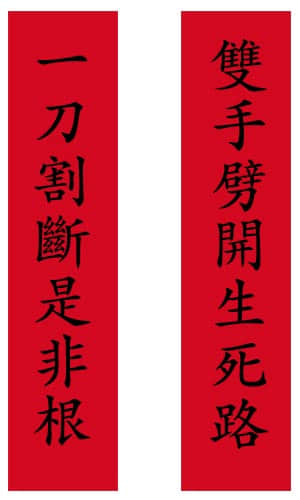
Chunlian gained popularity among the general population during the Ming Dynasty (1638-1644). And the name ”Chunlian” was coined then. The Emperor Hongwu, the founder of the Ming Dynasty, was a big fan of Chunlian. He issued a decree mandating that every household, regardless of social status or wealth, must display a spring couplet on their main door on New Year's Day. Curious to observe his subjects' compliance, the Emperor disguised himself and set out to witness their efforts. Most had beautifully crafted couplets, except for a certain illiterate butcher (also in business of Pig Castration) who had enlisted someone else to fulfill the imperial order. In an act of amusement, the Emperor personally wrote a couplet on scrolls, which read: 双手劈开生死路 ,一刀割断是非根 | 雙手劈開生死路, 一刀割斷是非根 (shuāng shǒu pī kāi shēng sǐ lù, yī dāo gē duàn shì fēi gēn). "With one blow of the hands, the road to life and death is cleft open; With one stroke of the knife, the root of right and wrong is cut off." People began hanging the couplets on their doorways, believing they would bring luck, fortune, and protection for the household in the coming year.
Over time, the tradition of hanging couplets during the Spring Festival spread and became more widespread, with the couplets taking on their characteristic red color and poetic style. The use of red paper is associated with the belief that red can drive away evil spirits and bring good fortune.
The couplets themselves are often written in poetic form, following specific rules and conventions of Chinese poetry. They contain wishes for abundance, prosperity, happiness, and good luck. Today, the tradition of hanging Spring Festival couplets continues to be an important part of Chinese New Year celebrations. They are seen as a way to welcome the new year with positive energy and to bring good fortune and blessings to the household.
4 Popular Chunlian Examples along with English Translations
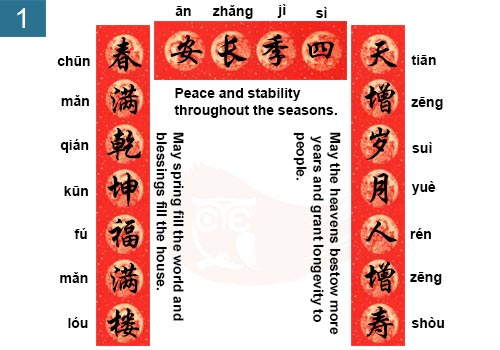
1. Shanglian 上联 (Shàng lián): 天增岁月人增寿 (tiān zēng suì yuè rén zēng shòu)
English: May the heavens bestow more years and grant longevity to people.
Xialian 下联 (Xià lián): 春满乾坤福满楼 (chūn mǎn qián kūn fú mǎn lóu)
English: May spring fill the world and blessings fill the house.
Hengpi 横批 (Héng pī): 四季长安 (sì jì zhǎng ān)
English: Peace and stability throughout the seasons.
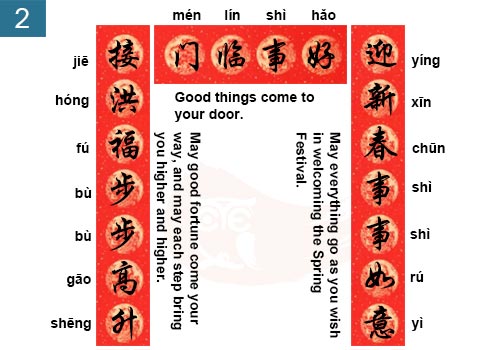
2. Shanglian 上联 (Shàng lián): 迎新春事事如意 (yíng xīn chūn shì shì rú yì)
English: May everything go as you wish in welcoming the Spring Festival.
Xialian 下联 (Xià lián): 接洪福步步高升 (jiē hóng fú bù bù gāo shēng)
English: May good fortune come your way, and may each step bring you higher and higher.
Hengpi 横批 (Héng pī): 好事临门 (hǎo shì lín mén)
English: Good things come to your door.
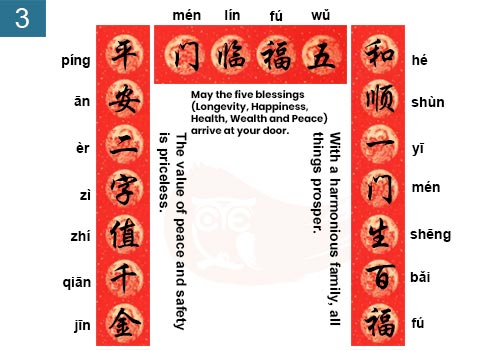
3. Shanglian 上联 (Shàng lián): 和顺一门生百福 (hé shùn yī mén shēng bǎi fú)
English: With a harmonious family, all things prosper.
Xialian 下联 (Xià lián): 平安二字值千金( píng ān èr zì zhí qiān jīn)
English: The value of peace and safety is priceless.
Hengpi 横批 (Héng pī): 五福临门 (wǔ fú lín mén)
English: May the five blessings(Longevity, Happiness, Health, Wealth and Peace) arrive at your door.
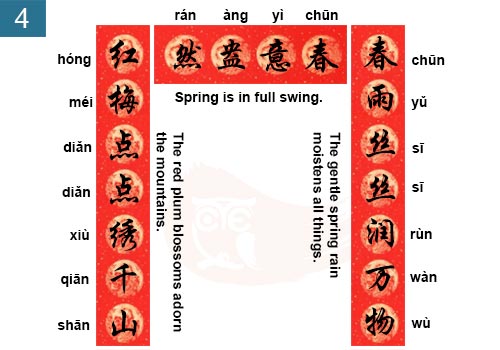
4. Shanglian 上联 (Shàng lián): 春雨丝丝润万物 (chūn yǔ sī sī rùn wàn wù)
English: The gentle spring rain moistens all things.
Xialian 下联 (Xià lián): 红梅点点绣千山 (hóng méi diǎn diǎn xiù qiān shān)
English: The red plum blossoms adorn the mountains.
Hengpi 横批 (Héng pī): 春意盎然 (chūn yì àng rán)
English: Spring is in full swing.
◆ ¹⁶ Lantern Riddles ignite the festive spirit of the Lunar New Year, blending poetry, language, and art into a captivating game of wit. Originating from China’s ancient streets, these puzzles transform lanterns into beacons of mystery and intellect.
As families and friends gather, deciphering these cryptic messages becomes more than tradition; it’s a delightful challenge that stitches bonds and sparks laughter.
In Lantern Riddles, where every lantern swing brings a new question, and every answer is a shared triumph. Lantern riddles are a popular traditional activity during the Lantern Festival, which is celebrated in many Asian countries. These riddles are a form of brain teaser that require critical thinking and creativity to solve. Participants are presented with a question or a statement that appears to be simple, but actually has a hidden meaning or a clever twist. The challenge lies in deciphering the true answer or meaning behind the riddle.
●What has a heart that doesn’t beat?
●What can run but never walks?
●What is always in front of you but can’t be seen?
●What has keys but can’t open locks?
●What has a thumb and four fingers but is not a hand?
●What has cities but no houses, forests but no trees, and rivers but no water?
●What has one eye but can’t see?
●What comes once in a minute, twice in a moment, but never in a thousand years?
●What has a neck but no head?
●What has a face but no eyes, hands but no arms?
●What is full of holes but still holds water?
●What is so fragile that saying its name breaks it?
●What has a ring but no finger?
●What has a tongue but cannot taste?
●What has a bottom at the top?
●What is black when you buy it, red when you use it, and gray when you throw it away?
Lantern Riddles (Boost Your Brainpower)
Lantern Riddles ignite the festive spirit of the Lunar New Year, blending poetry, language, and art into a captivating game of wit. Originating from China’s ancient streets, these puzzles transform lanterns into beacons of mystery and intellect.
As families and friends gather, deciphering these cryptic messages becomes more than tradition; it’s a delightful challenge that stitches bonds and sparks laughter.
In Lantern Riddles, where every lantern swing brings a new question, and every answer is a shared triumph.
Best Lantern Riddles with Answers
最佳灯谜及答案 Zuì jiā dēng-mí jí dá'-àn
1. The Silent Guardian 沉默的守护者 Chén-mò de shǒu-hù zhě
I hang in silence, yet speak in color and light,
At day I sleep, but solve puzzles by night.
What am I, guarding alleys and streets so bright?
我沉默不语,却用色彩和光线说话,
Wǒ chén-mò bù yǔ, què yòng sè-cǎi hé guāng-xiàn shuō-huà,
白天我睡觉,晚上却解谜。
bái-tiān wǒ shuì-jiào, wǎn-shàng què jiě mí.
我是谁,守卫着如此明亮的小巷和街道?
Wǒ shì shéi, shǒu-wèi-zhe rú-cǐ míng-liàng de xiǎo xiàng hé jiē-dào?
2. Celestial Whisperer 天界低语者 Tiān-jiè dī-yǔ zhě
I’m not a star, but I flicker afar,
In the night, I’m your dimly lit guide.
Holding secrets of the tide, what am I?
我不是星辰,但我在远方闪烁,
Wǒ bù-shì xīng-chén, dàn wǒ zài yuǎn-fāng shǎn-shuò,
在黑夜里,我是你微弱的灯光下的向导。
zài hēi-yè lǐ, wǒ shì nǐ wéi-ruò de dēng-guāng xià de xiàng-dǎo.
掌握着潮汐的秘密,我是谁?
Zhǎng-wò-zhe cháo-xī de mì-mì, wǒ shì shéi?
3. The Riddling Flame 谜团之火 Mí-tuán zhī huǒ
I dance and flicker, I never yell,
Crafting shadows, in my light, they dwell.
A riddle maker in a glowing shell, what am I?
我舞动闪烁,从不叫喊,
Wǒ wǔ-dòng shǎn-shuò, cóng bù jiào-hǎn,
我创造阴影,在我的光芒下,它们栖息。
wǒ chuàng-zào yīn-yǐng, zài wǒ de guāng-máng xià, tām-en qī-xī.
一个发光外壳里的谜语制造者,我是什么?
Yī-gè fā-guāng wài-ké lǐ de mí-yǔ zhì-zào zhě, wǒ shì shén-me?
4. Keeper of the Feast 盛宴守护者 Shèng-yàn shǒu-hù zhě
I stand in rows, a festive sight,
Guarding feasts from fading light.
What am I, that brightens the night?
我排成一排,一副喜庆的景象,
Wǒ pái chéng yī pái, yī fù xǐ-qìng de jǐng-xiàng,
守护着盛宴免受暗淡的光线侵袭。
shǒu-hù-zhe shèng-yàn miǎn shòu àn-dàn de guāng-xiàn qīn-xí.
我是什么,照亮了黑夜?
Wǒ shì shén-me, zhào liàng-le hēi-yè?
5. The Puzzle Weaver 拼图编织者 Pīn-tú biān-zhī zhě
I float on water, a drifting sage,
Carrying wishes, I’m wise as age.
What am I, on this liquid stage?
我漂浮在水面上,像一个漂泊的圣人,
Wǒ piāo-fú zài shuǐ-miàn shàng, xiàng yī-gè piāo-bó de shèng-rén,
带着愿望,我和年龄一样睿智。
dài-zhe yuàn-wàng, wǒ hé nián-líng yī-yàng ruì-zhì.
在这个液体舞台上,我是什么?
Zài zhè-ge yè-tǐ wǔ-tái shàng, wǒ shì shén-me?
Answers: 答案:Dá'-àn:
1. Answer: A Lantern. 一盏灯笼。Yī zhǎn dēng-lóng.
2. Answer: Moonlit Lantern. 月光灯笼。Yuè-guāng dēng-lóng.
3. Answer: Candle in a Lantern. 灯笼里的蜡烛。Dēng-lóng lǐ de là-zhú.
4. Answer: Table Lantern. 桌灯。Zhuō dēng.
5. Answer: Floating Lantern. 浮灯。Fú dēng.
6. The Whispering Wind 风之低语 Fēng zhī dī-yǔ
I sway at a touch, a dance in the breeze,
Carrying laughter and secrets with ease.
What am I, that moves as it pleases?
我随波逐流,在微风中翩翩起舞,
Wǒ suí-bō-zhú-liú, zài wéi-fēng zhōng piān-piān qǐ-wǔ,
轻轻松松地带着欢笑和秘密。
qīng qīng-sōng sōng dì-dài-zhe huān-xiào hé mì-mì.
我是什么,随心所欲地移动?
Wǒ shì shén-me, suí-xīn-suǒ-yù de yí-dòng?
7. The Colorful Enigma 多彩之谜 Duō-cǎi zhī mí
In reds and golds, I’m dressed so bold,
A riddle wrapped in folds untold.
What am I, in celebrations old?
我身着红色和金色,衣着大胆,
Wǒ shēn-zhe hóng-sè hé jīn-sè, yīz-huó dà-dǎn,
谜语被无尽的褶皱包裹着。
mí-yǔ bèi wú-jìn de zhě-zhòu bāo-guǒ-zhe.
在古老的庆典中,我是什么?
Zài gǔ-lǎo de qìng-diǎn zhōng, wǒ shì shén-me?
8. The Night’s Blossom 夜之花 Yè zhī huā
I bloom at dusk, with every moon,
A silent flower in the dark’s cocoon.
What am I, that fades too soon?
我在黄昏时分、在每个月光下绽放,
Wǒ zài huáng-hūn shí-fēn, zài měi gè yuè-guāng xià zhàn-fàng,
一朵在黑暗茧中沉默的花朵。
yī duǒ zài hēi'-àn jiǎn zhōng chén-mò de huā-duǒ.
我是什么,为何凋谢得太早?
Wǒ shì shén-me, wèi-hé diāo-xiè dé tài zǎo?
9. The Guiding Light 指引之光 Zhǐ-yǐn zhī guāng
Through ancient streets, I lead the way,
A beacon for those who stray.
What am I, that doesn’t sway?
穿越古老的街道,我引领前行,
Chuān-yuè gǔ-lǎo de jiē-dào, wǒ yǐn-lǐng qián xíng,
迷途者的灯塔。
mí-tú zhě de dēng-tǎ.
我是什么,不动摇?
Wǒ shì shén-me, bù dòng-yáo?
10. The Festive Puzzle 节日之谜 Jié-rì zhī mí
I’m hung with care, a puzzle in air,
In festivals, I’m seen everywhere.
What am I, that’s both fair and square?
我挂满忧虑,空中飘浮着谜团,
Wǒ guà mǎn yōu-lǜ, kōng-zhōng piāo-fú-zhe mí-tuán,
在节日里,我随处可见。
zài jié-rì lǐ, wǒ suí-chù kě-jiàn.
我是什么,如此公平公正?
Wǒ shì shén-me, rú-cǐ gōng-píng gōng-zhèng?
Answers:答案:Dá'-àn:
1. Answer: A Lantern. 一盏灯笼。Yī zhǎn dēng-lóng.
2. Answer: Moonlit Lantern. 月光灯笼。Yuè-guāng dēng-lóng.
3. Answer: Candle in a Lantern. 灯笼里的蜡烛。Dēng-lóng lǐ de là-zhú.
4. Answer: Table Lantern. 桌灯。Zhuō dēng.
5. Answer: Floating Lantern. 浮灯。Fú dēng.
6. Answer: Wind Chime Lantern. 风铃灯。Fēng-líng dēng.
7. Answer: Traditional Chinese Lantern. 传统的中国灯笼。Chuán-tǒng de zhōng-guó dēng-lóng.
8. Answer: Night Lantern. 夜燈。Yè dēng.
9. Answer: Street Lantern. 街燈。Jiē-dēng.
10. Answer: Decorative Lantern. 装饰灯笼。Zhuāng-shì dēng-lóng.
Lantern Riddles for Adults 成人灯谜 Chéng-rén dēng-mí
1. The Midnight Scholar 午夜学者 Wǔ-yè xué-zhě
In the quiet night, I hold tales untold,
A beacon for the mind, my light is bold.
What am I, that in your hand you hold?
在静夜里,我怀抱未讲的故事,
Zài jìng yè-lǐ, wǒ huái-bào wèi jiǎng de gù-shì,
心灵的灯塔,我的光芒无比强大。
xīn-líng de dēng-tǎ, wǒ de guāng-máng wú-bǐ qiáng-dà.
你手中握着的我是什么?
Nǐ shǒu-zhōng wò-zhe de wǒ shì shén-me?
2. The Enigmatic Companion 神秘的同伴 Shén-mì de tóng-bàn
I follow you at night, a silent ally in sight,
Shape-shifting at your feet, with no fright.
What am I, disappearing by daylight?
我在夜晚跟随你,像一个无声的盟友,
Wǒ zài yè-wǎn gēn-suí nǐ, xiàng yī-gè wú-shēng de méng-yǒu,
在你的脚下变形,毫无恐惧。
zài nǐ de jiǎo-xià biàn-xíng, háo wú kǒng-jù.
我是什么,在白天消失?
Wǒ shì shén-me, zài bái-tiān xiāo-shī?
3. The Celestial Guide 天体指南 Tiān-tǐ zhǐ-nán
I chart the path for those who roam,
A silver guardian in the celestial dome.
What am I, that sailors call home?
我为那些流浪的人绘制道路,
Wǒ wèi nà-xiē liú-làng de rén huì-zhì dào-lù,
天穹中的银色守护者。
tiān-qióng zhōng de yín-sè shǒu-hù zhě.
我是什么,水手们称之为家?
Wǒ shì shén-me, shuǐ-shǒu-men chēng zhī wéi jiā?
4. The Keeper of Secrets 秘密的守护者 Mì-mì de shǒu-hù zhě
I whisper in the dark, a holder of sparks,
In me, wisdom and folly leave their marks.
What am I, that lights up the parks?
我,一个火花的持有者,在黑暗中低语,
Wǒ, yī-gè huǒ-huā de chí yǒu zhě, zài hēi'-àn zhōng dī-yǔ,
在我身上,智慧和愚蠢都留下了痕迹。
zài wǒ shēn-shang, zhì-huì hé yú-chǔn dōu-liú xià-le hén-jī.
我是什么,照亮了公园?
Wǒ shì shén-me, zhào liàng-le gōng-yuán?
5. The Twilight Sentry 暮光哨兵 Mù guāng shào-bīng
I stand watch when the sun takes its bow,
A silent sentinel, but don’t ask how.
What am I, that’s seen with a vow?
当太阳落山时,我站在那里守望,
Dāng tài-yáng luò-shān shí, wǒ zhàn zài nà-lǐ shǒu-wàng,
一个沉默的哨兵,但不要问我是如何做到的。yī-gè chén-mò de shào-bīng, dàn bù-yào wèn wǒ shì rú-hé zuò dào de.
我是什么,凭什么立下誓言?
Wǒ shì shén-me, píng shén-me lì xià shì-yán?
Answers:
1. A Book by Lantern Light. 灯笼下的一本书。Dēng-lóng xià de yī běn shū.
2. Answer: Shadow. 阴影。Yīn-yǐng.
3. Answer: The North Star. 北极星。Běi-jí-xīng
4. Answer: A Park Bench Under a Lantern. 灯笼下的公园长椅。Dēng-lóng xià de gōng-yuán cháng yǐ.
5. Answer: The Moon. 月亮。Yuè-liàng.
Lantern Riddles for Kids 儿童灯谜 Ér-tóng dēng-mí
1. The Friendly Glow 友善的光芒 Yǒu-shàn de guāng-máng
I’m not a sun, but I light up the fun,
Hanging above, when the day is done.
What am I, seen by everyone?
我不是太阳,但我照亮了欢乐,
Wǒ bù-shì tài-yáng, dàn wǒ zhào liàng-le huān-lè,
当一天结束时,悬挂在天空。
dāng yī-tiān jié-shù shí, xuán-guà zài tiān-kōng.
在众人眼中,我是什么?
Zài zhòng-rén yǎn-zhōng, wǒ shì shén-me?
2. The Night’s Artist 夜晚的艺术家 Yè-wǎn de yì-shù-jiā
I draw pictures that move with ease,
On walls and floors, I do as I please.
What am I, that plays with light and trees?
我画的画动感十足,
Wǒ huà de huà dòng-gǎn shí-zú,
在墙壁和地板上,我随心所欲。
zài qiáng-bì hé dì-bǎn shàng, wǒ suí-xīn-suǒ-yù.
我是什么,玩弄光和树木?
Wǒ shì shén-me, wàn-nòng guāng hé shù-mù?
3. The Moon’s Puzzle 月球之谜 Yuè-qiú zhī mí
I’m not a star, but I shine so bright,
Changing my shape throughout the night.
What am I, that’s often full and white?
我不是星星,但我却如此耀眼,
Wǒ bù-shì xīng-xīng, dàn wǒ què rú-cǐ yào-yǎn,
整夜变换着我的形状。
zhěng yè biàn-huàn-zhe wǒ de xíng-zhuàng.
我是什么?常常又饱满又洁白?Wǒ shì shén-me? Cháng-cháng yòu bǎo-mǎn yòu jié-bái?
4. The Evening Butterfly 🦋 晚间蝴蝶 Wǎn-jiān hú-dié
I flutter high, with light in my core,
At festivals, I’m seen more and more.
What am I, that children adore?
我高高飞扬,内心充满光明,
Wǒ gāo gāo fēi-yáng, nèi-xīn chōng-mǎn guāng-míng,
在节日里,我越来越被人看到。
zài jié-rì lǐ, wǒ yuè lái yuè bèi rén kàn dào.
我是什么,孩子们崇拜我?
Wǒ shì shén-me, hái-zi-men chóng-bài wǒ?
5. The Twilight Spark 暮光火花 Mù guāng huǒ-huā
I sit in the garden, not making a mark,
Until the sun goes down, and it gets dark.
What am I, that lights up the park?
我坐在花园里,没有留下任何痕迹,
Wǒ zuò zài huā-yuán lǐ, méi-yǒu liú xià rèn-hé hén-jī,
直到太阳下山,天色渐暗。
zhí-dào tài-yáng xià-shān, tiān-sè jiàn àn.
我是什么,照亮了整个公园?
Wǒ shì shén-me, zhào liàng-le zhěng-gè gōng-yuán?
Answers: 答案: Dá'-àn:
1. Answer: A Bedroom Night Light. 卧室夜灯。Wò-shì yè dēng.
2. Answer: Shadow. 阴影。Yīn-yǐng.
3. Answer: The Moon. 月亮。Yuè-liàng.
4. Answer: Paper Lantern. 纸灯笼。Zhǐ dēng lóng.
5. Answer: Solar Garden Light. 太阳能花园灯。Tài-yáng-néng huā-yuán dēng.
■ Easy Lantern Riddles 简单的灯谜 Jiǎn-dān de dēng-mí
1. The Cozy Light 温馨之光 Wēn-xīn zhī guāng ; (Traditional Chinese: 舒適的燈光 Shū-shì de dēng-guāng )
I sit on your table, or hang in the night,
A little flame makes me bright.
What am I, that’s a comforting sight?
我坐在你的桌子上,或挂在夜里,
Wǒ zuò zài nǐ de zhuō-zi shàng, huò guà zài yè-lǐ,
一小团火焰让我明亮。yī xiǎo tuán huǒ-yàn ràng wǒ míng-liàng.
我是什么,那是一种令人欣慰的景象?Wǒ shì shén-me, nà shì yī zhǒng lìng rén xīn-wèi de jǐng-xiàng?
2. The Evening Star 晚星报 Wǎn xīng bào
I’m not in the sky, but I twinkle from afar,
Hanging in backyards or by the bazaar.
What am I, that mimics a star?
我不在天空,但我在远处闪烁,
Wǒ bù-zài tiān-kōng, dàn wǒ zài yuǎn chù shǎn-shuò,
悬挂在后院或集市旁。
xuán-guà zài hòu-yuàn huò jí shì páng.
我是什么,模仿星星?
Wǒ shì shén-me, mó-fǎng xīng-xīng?
3. The Nighttime Flower 夜之花 Yè zhī huā
I bloom with light, not in the day,
At night in your garden, I sway.
What am I, that doesn’t stay?
我在光明中绽放,而不是在白天,
Wǒ zài guāng-míng zhōng zhàn-fàng, ér bù-shì zài bái-tiān,
在夜晚,在你的花园里,我摇曳。
zài yè-wǎn, zài nǐ de huā-yuán lǐ, wǒ yáo-yè.
我是什么,不会停留?
Wǒ shì shén-me, bù huì tíng-liú?
4. The Guiding Spirit 指导精神 Zhǐ-dǎo jīng-shén
I don’t walk, but I lead the way,
Through streets and alleys, I make your day.
What am I, that doesn’t stray?
我不走,但我引领你前行,
Wǒ bù zǒu, dàn wǒ yǐn-lǐng nǐ qián xíng,
走过大街小巷,我让你心情愉悦。
zǒu guo dà-jiē xiǎo xiàng, wǒ ràng nǐ xīn-qíng yú-yuè.
我是谁,不会迷失方向?
Wǒ shì shéi, bù huì mí-shī fāng-xiàng?
5. The Festive Dancer 节日舞者 Jié rì wǔ zhě
I swing and sway in the breeze,
At festivals, I hang with ease.
What am I, that always pleases?
我在微风中摇曳,
Wǒ zài wéi-fēng zhōng yáo-yè,
在节日里,我轻松地悬挂。
zài jié-rì lǐ, wǒ qīng-sōng de xuán-guà.
我是什么,总能让人愉悦?
Wǒ shì shén-me, zǒng néng ràng rén yú-yuè?
Answers: 答案:Dá'àn:
1. Answer: Candle Lantern. 蜡烛灯笼。Là zhú dēng lóng.
2. Answer: Twinkling Lantern. 闪烁的灯笼。Shǎn shuò de dēng-lóng.
3. Answer: Solar Garden Lantern. 太阳能花园灯笼。Tài yáng néng huā yuán dēng-lóng.
4. Answer: Street Lamp. 路灯。Lù dēng.
5. Answer: Hanging Paper Lantern. 悬挂纸灯笼。Xuán guà zhǐ dēng-lóng.
No comments:
Post a Comment